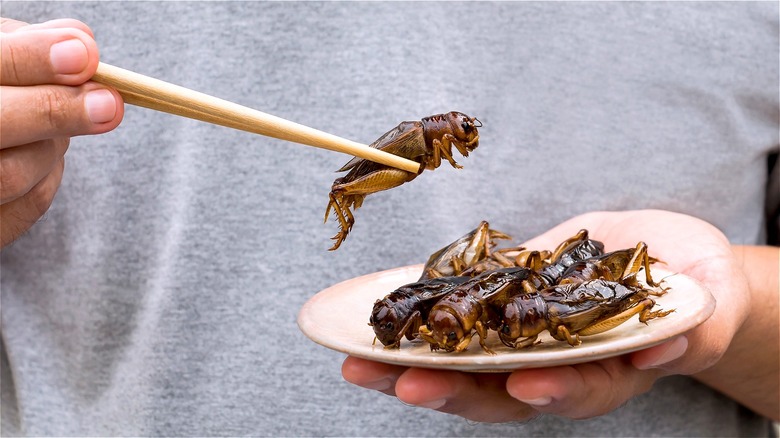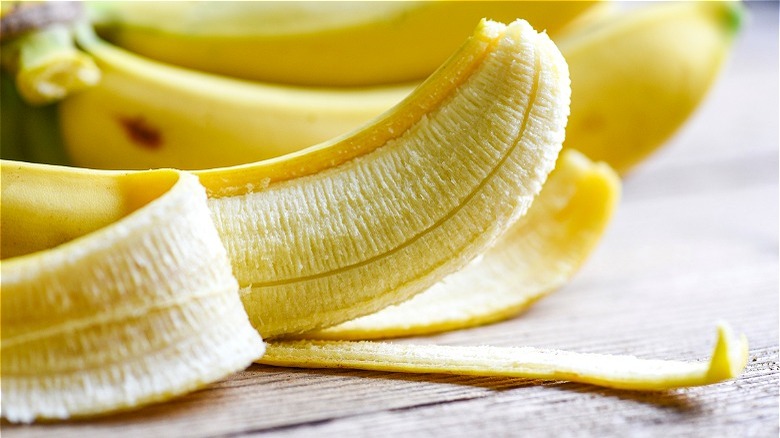Can Vegans Eat Insects?
According to Biology Online, history indicates humans have followed a plant and animal-based diet since the beginning of mankind, yet people all over the world continue to choose what's right for them based on personal ethics, dietary restrictions, and culture-specific food practices. While the average world citizen's daily diet contains over 40% carbohydrates, National Geographic showcases the breakdown of differences per country. India, for example, consumes the least amount of meat compared to every other country in the world.
If you want to go beyond general vegetarianism, which Britannica defines as a diet excluding all forms of meat yet varies on the usage of dairy and egg products, The Vegan Society defines veganism as refraining from the use of any form of animal products in food, clothing, and other commonly used items. "In dietary terms, it denotes the practice of dispensing with all products derived wholly or partly from animals." TIME explains how the term "vegan" was coined by British woodworker Donald Watson in 1944 to give a label to those who abstained from the consumption of eggs and dairy. Fast forward to the present and Statista now claims 2% of the U.S. population follows a vegan diet. Though sometimes, determining if a food is actually vegan or not can be confusing. Moreover, what are the food rules associated with the vegan diet? Sure chicken and milk are off-limits, but what about bugs?
Insects are also animals
The Conversation notes that Cameroon, Nigeria, and other countries located in Africa practice entomophagy or eating insects more than any other sector of the world. Insects not only provide a significant amount of nutrition, but the practice of entomophagy helps alleviate the stress of potential food insecurity. Additionally, the University of Edinburgh predicts the market for edible insects will only expand in the U.S. and Europe. There is already one Finland bakery that makes bread from crushed crickets. Recent research from the University of Helsinki discovered that if more people in Europe engaged in entomophagy, citizens could significantly reduce their direct impact on the environment. Maybe insects aren't the most popular protein source in America or Europe, but if they have the potential to reduce our carbon footprint, does that mean they get the green light from vegans?
Unfortunately, one 2019 survey from Vomad found that only 9.7% of almost 13,000 participants follow a vegan diet for environmental reasons. Also, Earth.com reminds us that insects are still animals and the cardinal rule of veganism is to abstain from the cruelty, use, and general consumption of all living beings. All in all, while it's true that most vegans use their own judgment, insects are typically off-limits. Finding out vegans can't eat insects may not come as a surprise, but there are plenty of other restricted foods that will surprise you.
Unexpected foods that aren't vegan-friendly
Finding out vegans don't eat insects shouldn't come as a shock. Based on one 2019 study conducted by the University of Eastern Finland surrounding how vegans, vegetarians, and omnivores felt about entomophagy, even after learning insects were cost-effective and safe to consume, vegans had the strongest and most negative attitude toward the prospect, One professor from the University of Finland, Anna-Liisa Elorinne, stated that vegans also made a point to note how eating insects will still not fix the global food shortage.
Beyond bugs, what are some foods you wouldn't expect to be off-limits? New vegans may be looking for that perfect egg substitute for their trusted banana bread recipe but The Vegan Review claims conventional bananas are typically sprayed with chitosan which is a spray coating derived from crustacean shells used to extend a banana's shelf life. And figs? Healthline states how debate remains on whether or not this fruit is vegan due to the intrinsic connection between fig production and the eventual death of wasps. Planted showcases how certain brands of orange juice are fortified with vitamin D3 which is sometimes cultivated from sheep's wool or fish oil.
If you're considering veganism, Vegan First provides a trusty list of sneaky ingredients to look out for when attempting to choose products that are completely animal free. While there may be some trickier foods out there in the world of animal detection, insects are a no-go for most self-proclaimed vegans.


